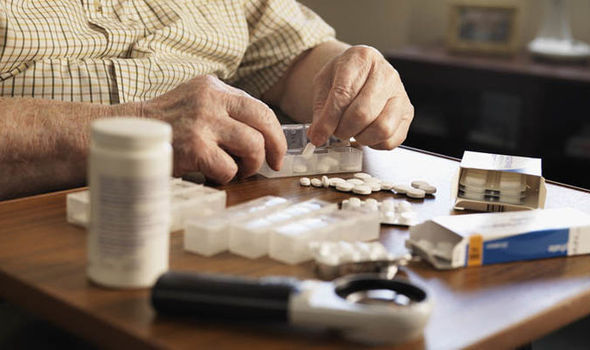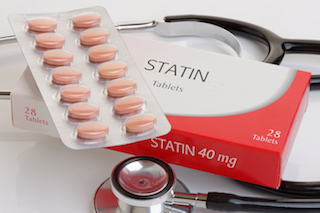SHARES

“My doctor advised me to start taking statins because I have a high cholesterol level. However, the idea of taking medicine everyday sounds daunting to me. Besides I’m worried about getting side effects from the drug too. A friend of mine had leg pain after taking statin medication.” Christine, 62, is worried about having heart attack as well as the idea of having to take statins.
What are Statins for?
Statins lower your blood cholesterol level, especially the bad cholesterol (LDLc). A high level of bad cholesterol can increase your risk for heart attack and stroke. Your risk is even higher if you have high cholesterol together with other risk factors such as advanced age, high blood pressure, high blood sugar, obesity, family history of heart attack, smoking, heavy alcohol consumption. Men generally have higher risk than women for getting a heart attack and stroke.
Should I take Statins?
Usually, your doctor will counsel you on ways to prevent heart attack and stroke through lifestyle changes. Changes such as regular exercising, healthy food choice, quit smoking, and moderation in alcohol consumption. If these methods fail to lower your risk for heart attack and stroke, you doctor will prescribe statins to aid you in lowering your cholesterol levels. Several recent research studies show statins can reduce your risk for heart attack and stroke by at least 25% to as much as 35%.
Also, if you had a previous heart attack or stroke, your doctor will prescribe statins to prevent them from occurring again. According to studies, the risk for recurrent strokes or heart attacks reduce by about 40% with statin medication.
The benefits of statins far outweigh the risks, according to a scientific statement from the American Heart Association based on new analysis of decades of scientific research published in Arteriosclerosis, Thrombosis and Vascular Biology.
Photo by Reputation Tempe from Flickr
Are There Any Side Effects With Statin Use?
Statins are a relatively safe class of drugs with minimal or no side effects. Even if side effects are present, they are usually mild and you can still continue with the medication.
1. Muscle soreness, weakness and break down
About 5% or less of people taking statin experience muscle aches and weakness. These are usually very mild and well-tolerated. Speak to your doctor if you have these troubling symptoms. Your doctor can help by changing your medicine to another type of statin or reduce the dosage. On very rare occasions, serious muscle break down (rhabdomyolysis) can occur causing severe muscle pain, liver damage, kidney failure which is potentially life threatening. This can be due to direct muscle trauma, very high statin dose, and the combination of drugs. However the risk of very serious side effects is extremely low, occurring in a few cases per million patients on statins.
2. Higher blood sugar level
0.5-1% of patients taking statins have slight increase in blood sugar level and diabetes mellitus risk. This can occur in patients who are taking high dose of statin with pre-existing risk for diabetes mellitus. In this small group of patients, blood sugar level returns to normal after reducing drug dose or changing to another type of statin.
3. Liver damage
Uncommonly, some people may experience liver inflammation. In such cases, the signs are increased level of liver enzymes indicating liver inflammation. If the increase in liver enzyme is only mild, you can continue to take the drug. It happens rarely but if the increase is severe, your doctor may try prescribing a different statin.
As a precaution, your doctor may order a liver enzyme test before or just after you start taking statins. Consult your doctor immediately if you get weak or tired easily, pass dark coloured urine, feel pain the upper abdomen or observe yellowing of the skin or eyes
4. Memory loss?
A few studies found that statins may be causing poor memory in some patients. However, there is no strong evidence showing the causal link of statin to memory loss. Current evidences as a whole suggest that memory loss is not related to statin use.
5. Acute kidney injury and chronic kidney disease
Some research studies found that patients taking high dose of statins before major heart surgery had acute kidney injury after the operation. However, larger studies show that these two are not related. Therefore in this context, the kidney injury can be a complication by poor blood flow after heart surgery or is pre-existing chronic kidney disease. On the contrary, statins are generally protective towards the heart and kidney (for those who do not require dialysis).
Conclusion
Statins are relatively safe drugs that save lives by to reducing risk to heart attacks and strokes. Some of us may experience side effects like muscle ache, body weakness and higher blood sugar. Liver damage occurs occasionally. But, these symptoms usually go away with dose reduction or change in medicine type. Poor memory, kidney injury are not proven side effects of statins.
Research has demonstrated that the benefits far outweigh the risks. Do follow your doctor’s advice to continue with statins that could be life saving for you. Besides statin medication, remember persevering in healthy lifestyle changes, are just as important factors in managing lower risks to heart attacks and strokes.

Find a GP/Family Doctor in Malaysia, on GetDoc
Find a GP/Family Doctor in Singapore, on GetDoc
References:
1. Honore PM, Jacobs R, Hendrickx I, De Waele E, Van Gorp V, De Regt J, et al. Statin and the kidney: friend or foe? Blood Purif. 2017;43:91-96.
2. Gordon HS. Statins: the good, the bad, and the unknown [Medscape]. WebMD LLC. 2014. [Available from: https://www.medscape.com/viewarticle/832841_2; last updated on 2014 Oct 10; last accessed on 2019 Jul 20]
3. Mayo Clinic: https://www.mayoclinic.org/diseases-conditions/high-blood-cholesterol/in-depth/statin-side-effects/art-20046013
4. Dec 2018 Report: https://www.heart.org/en/news/2018/12/10/safety-of-statins-emphasized-in-new-report
by Chang Xian
View all articles by Chang Xian.






